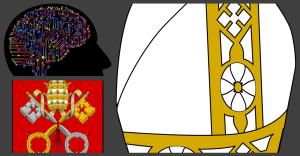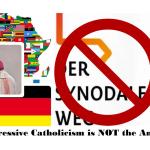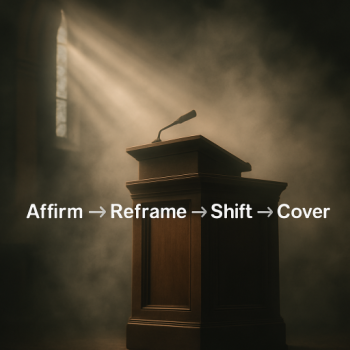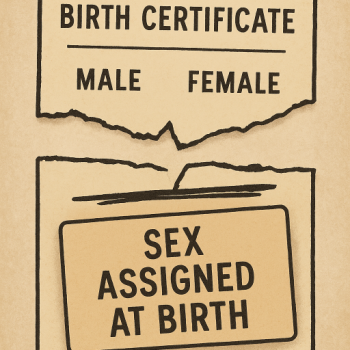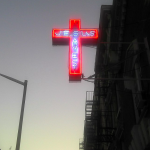A friend of mine informed me about a new online tool called Magisterium AI (currently in its Beta phase). Created by US entrepreneur, Matthew Sanders, the National Catholic Register quotes Mr. Sander’s goals with the AI:
Our core objective is to make Catholic insight and Church teaching available to anyone in the world, on any device, in their native language…
In the “About” tab on the site, Magisterium AI makes this claim about itself.
Magisterium AI makes accessible the teaching of the Catholic Church like never before. Whether you’re seeking answers on Church teaching, conducting research, or are just trying to save some time, Magisterium AI is at your disposal 24 hrs a day / 7 days a week.
Our AI references more than 6,000 documents of the Catholic Church that fall within the Extraordinary and Ordinary Magisterium.
Wonder where the generated answers come from? Citations are available with every generated response so you can do a little follow-up investigation should you wish to.
All this access to official Church teaching, via a click of a button, found me intrigued.
Asking Magisterium AI some current hot button Catholic question is a fun and insightful way to utilize this new technology. For the sake of clarity and transparency, I provide the questions and the answers. To verify the answers yourself, please input the question in Magisterium AI. I tried to provide the question’s link. Unfortunately, the site only saves your last inquiry.
So, what does Magisterium AI say about…
The Catholic Teaching on Female Priests
The Catholic Church teaches that it does not have the authority to confer priestly ordination on women. This teaching is based on the example of Jesus and the practice of the early Church, as well as the understanding of the respective roles of men and women in the Church. The Church considers the reservation of priestly ordination to men as a way to remain faithful to the type of ordained ministry established by Jesus and maintained by the Apostles. The Church affirms the equal personal dignity of men and women and the need to overcome discrimination in fundamental rights. The Church teaches that women have a different role to play in the Church, as exemplified by the holy women in the Gospel and throughout history. The Church welcomes and encourages women’s active participation in the Church’s life and mission as members of the common priesthood 12345.
References
2 Ten Frequently Asked Questions About the Reservation of Priestly Ordination to Men 1
4 To the Bishops of the United States of America on their ad Limina visit (July 2, 1993) 6
5 Ten Frequently Asked Questions About the Reservation of Priestly Ordination to Men 9
Observation
Off the bat, this new AI appears theologically solid. It also cites official Church documents. So far, so good.
What are the moral implications of blessing same-sex unions according to the Catholic Church?
According to the Catholic Church, blessing same-sex unions is considered illicit and cannot be considered licit. The Church teaches that blessings on persons are in relationship with the sacraments, and the blessing of homosexual unions cannot be considered analogous to the nuptial blessing invoked on a man and woman united in the sacrament of Matrimony. The Church affirms that there are no grounds for considering homosexual unions to be similar or remotely analogous to God’s plan for marriage and family. Therefore, the Church does not have the power to give the blessing to unions of persons of the same sex. However, the Church does not preclude blessings given to individual persons with homosexual inclinations who manifest the will to live in fidelity to the revealed plans of God as proposed by Church teaching. It is important to note that the Church’s stance on blessing same-sex unions is not a form of unjust discrimination but a reminder of the truth of the liturgical rite and the nature of sacramentals as understood by the Church. The Church emphasizes that God Himself never ceases to bless each person, but He does not and cannot bless sin. He blesses sinful man so that he may recognize his part in God’s plan of love and allow himself to be changed by Him. Therefore, the Church cannot bless unions of persons of the same sex in the sense intended above. 1 2
The moral implications of blessing same-sex unions, according to the Catholic Church, are rooted in the understanding of marriage as the basis of the family and the primary unit of society. The Church teaches that respect for homosexual persons does not lead to approval of homosexual behavior or legal recognition of homosexual unions. The Church upholds the common good, which requires laws to recognize, promote, and protect marriage. Legal recognition of homosexual unions or placing them on the same level as marriage would not only approve deviant behavior but also obscure basic values that belong to the common inheritance of humanity. The Church defends these values for the good of men, women, and society itself. 3
References
2 Article of Commentary on the Responsum ad dubium
3 Considerations Regarding Proposals to Give Legal Recognition to Unions Between Homosexual Persons 11
Observation
Again, solid information here. Some lay and ordained German Catholics would do well by using this AI. Anyone with their email address, please send the link to them.
Can a Catholic Support Political Abortion?
According to Catholic teaching, it is not permissible for a Catholic to support political abortion, which refers to the legalization or promotion of abortion. The Congregation for the Doctrine of the Faith states that Catholics, including politicians, have a duty to oppose laws that attack human life, such as those that legalize abortion1. The same document also mentions that if it is not possible to completely repeal an unjust law allowing abortion, a Catholic politician could support proposals aimed at limiting the harm done by such a law and lessening its negative consequences2. However, this support must be accompanied by a clear and well-known personal opposition to the law itself, and the danger of scandal must be avoided2.
The United States Conference of Catholic Bishops emphasizes that as Catholics, we are not single-issue voters, but a candidate’s position on a single issue that promotes an intrinsically evil act, such as legal abortion, can disqualify them from receiving support3.
Therefore, based on Catholic teaching, a Catholic cannot support political abortion, but may work to limit the harm caused by such laws if complete repeal is not possible2.
References
1 The Participation of Catholics in Political Life 4
2 Considerations Regarding Proposals to Give Legal Recognition to Unions Between Homosexual Persons 10
Observation
Nothing but more good information here, well, for certain Catholics… Some Catholics who see abortion as merely “one issue” among many will find this answer frustrating.
Why Do Only Bishops Lead the Church?
Only bishops lead the Church because they have received the fullness of the sacrament of Holy Orders, which integrates them into the episcopal college and makes them the visible heads of the particular Churches entrusted to them. As successors of the apostles and members of the college, bishops share in the apostolic responsibility and mission of the whole Church under the authority of the Pope, who is the successor of St. Peter 1. Bishops are chosen and consecrated by the sacrament of Holy Orders, which enables them to act in the person of Christ the head for the service of all the members of the Church 2. The sacrament of Holy Orders can only be conferred by validly ordained bishops, who are the successors of the apostles 3. It is bishops who confer the sacrament of Holy Orders in the three degrees 4. The Apostles themselves were bishops, as they had the power to administer the Sacraments of Confirmation and Holy Orders and make laws for the Church, which belong to bishops alone 5. Therefore, only bishops, as ordained ministers who have received the fullness of the sacrament of Holy Orders, lead the Church.
References
1 A Catechism of Christian Doctrine (The Baltimore Catechism No. 3) 54
2 A Catechism of Christian Doctrine (The Baltimore Catechism No. 3) 507
4 CCC 894
Observation
For those who desire greater lay leadership, this entry shows why such leaders present a problem. Only bishops receive the fullness of the Sacrament of Holy Orders and exist as living heirs to the apostles through apostolic succession.
Does the Catholic Church Support Slavery?
The Catholic Church unequivocally condemns slavery and various forms of violence 1. The Church has historically sought to eliminate slavery and has been a strong champion of freedom 2. The Church recognizes the inalienable dignity of each person and regards the ownership of wealth as a right, subject to the common good and governed by a “social mortgage” 3. In the past, the Church has redeemed slaves and Christians have sold themselves into slavery to deliver slaves 4. However, it is important to note that these actions were aimed at liberating slaves and were not an endorsement or support of slavery itself. The Church’s teachings emphasize the need for justice, love, and acceptance of all individuals 1. Therefore, the Catholic Church does not support slavery as it opposes the ownership and exploitation of individuals as property.
References
3 The Common Good and the Catholic Church’s Social Teaching 109
Observation
Many critics of the Church accuse her, if not supporting slavery, of not adequately opposing it. While this may not convince those detractors, it does provide anyone of goodwill proof that the Church has (and does) oppose slavery.
Final Thoughts…
All in all, Magisterium AI impressed me. For anyone looking to quickly look up the Church’s official teaching, with easy to access citation links, this AI will prove invaluable. Furthermore, with the site constantly updating with new documents, the site will only grow in relevance. One drawback to the site concerns its limited search feature (20 searches a week), with unlimited coming with the Pro subscription with a not so modest monthly fee.
Now, time for you to use it. Please share what you find out.
Thank you!
Read The Latin Right’s other writing here.


